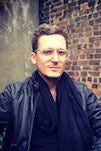
Journalist Robert S. Eshelman is looking forward to diving back into one of the most important environmental beats of our time: climate change. “That story will evolve over the rest of my lifetime and it poses the greatest existential threat to all human kind.”
An alumnus of Metcalf Institute’s 2012 Annual Science Immersion Workshop for Journalists, Eshelman has held editorial positions overseeing science and environmental coverage for several online news outlets, including Vice Media and, most recently, Seeker.com, and was an associate producer on “Years of Living Dangerously,” an Emmy Award-winning documentary series about climate change. As he began settling into his new management position this past January at Seeker.com, a dramatic shift was happening in Washington as President Trump ushered in new leadership and priorities regarding environmental regulations. “All of those things just elevated and amplified climate change, environmental topics in general,” he said.
“One of the early stories we did was to look at what happened in Australia with similar circumstances where a conservative government came in and disregarded the input of scientists around issues of climate change,” recalled Eshelman. “We explored the intersection of science and politics and what that looks like in other places throughout the world.”
For the most part, Eshelman edits stories for about a dozen journalists at Seeker.com on a range of topics including energy, space exploration, technology sectors, and medicine. However, as environmental news coverage becomes increasingly more political with higher stakes, Eshelman is eager to return to the environment beat that he has covered since 2009.
“It’s an incredible story, one of the most important stories out there and we’re right in the center of it, covering the science and politics of it,” explained Eshelman. He added that he was also motivated to cover climate change “because the country in which I was born, raised and continue to live shares the greatest historical responsibility for the current climate crisis.”
Eshelman, who holds a masters degree in journalism from Columbia University, still uses the science translation tools he developed during his Metcalf fellowship. “It’s not easy to take science journal articles and translate them into language that the general public might understand,” he said, and offered this advice to the ten fellows selected for the 2017 Annual Workshop: “Take time to listen to the scientists you’ll meet,” he said. “The better you understand what makes a scientists tick, the better your reporting will be.”
As for the future direction of Eshelman’s career, it’s clear that he will not be leaving journalism anytime soon. “At the end of the day, I get most satisfaction from writing.”
Read More Alumni Profiles